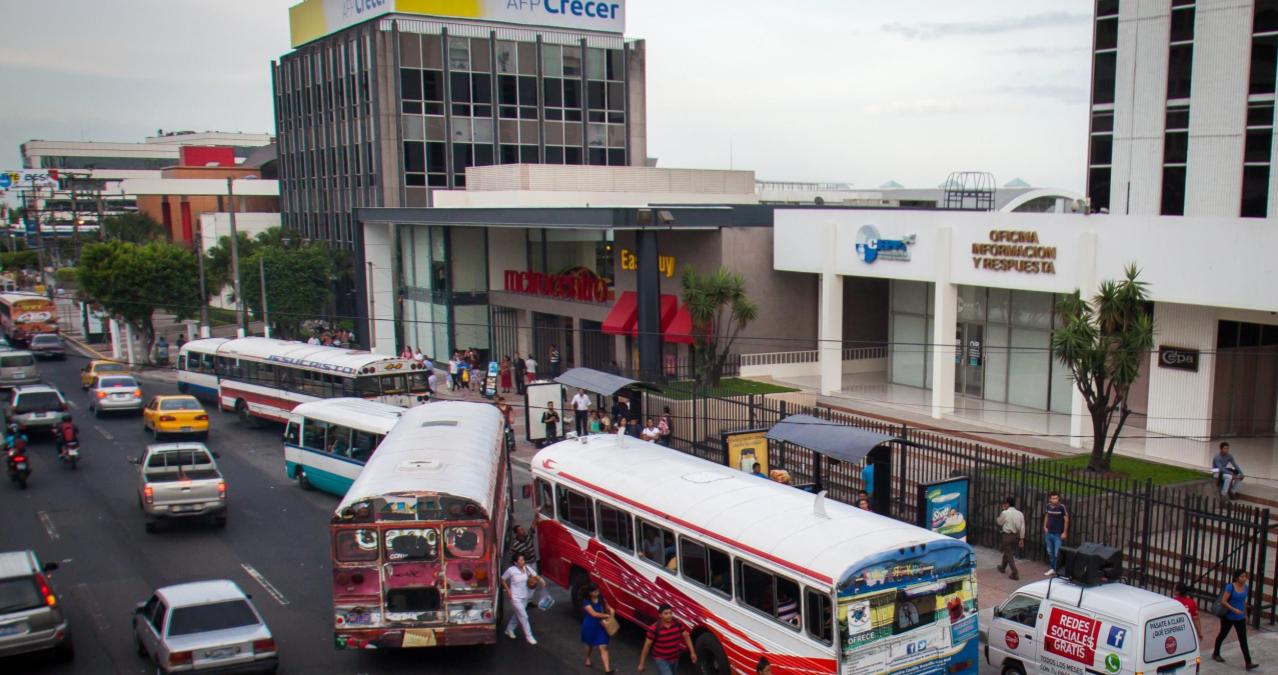Chair of Southern Voice, Dr Debapriya Bhattacharya, was invited to participate in and speak at a Roundtable Discussion on "Multilateral…
by Margarita Beneke de Sanfeliú
(with inputs from Mario Chávez and Marjorie de Trigueros)
In this blog for Southern Voice the Fundación Salvadoreña para el Desarrollo Económico y Social (FUSADES) shares its findings related to SDG 11 (sustainable cities and communities). FUSADES has identified preventive measures to reduce crime in public transportation in El Salvador and is now working on engaging stakeholders to increase safety, especially for women.
Every day, Pedro and Karen take the bus to go to work. Both are used to keeping their eyes open for muggers on the bus. Karen has gotten used to being touched by male passengers. Neither feels safe, especially on their way back at night. But for them, as well as for the majority of Salvadorians, public transportation is the only option to move around the city.
Crime in public transportation system is a very serious problem. Especially for women, getting on a bus is no fun.
In El Salvador, almost 70% of the population feels somewhat or totally unsafe in buses and at bus stops. In fact, these are the places where people feel most unsafe. More than 20% of all robberies and thefts occur inside buses. Another 8% occur at bus stops. These are alarming numbers, considering that almost 80% of the population relies on public transportation.
Three years ago, FUSADES conducted a study on this matter that is now starting to bear fruits. Our aim was to identify solutions to prevent crime and reduce fear of crime.
As we faced a lack of reliable data, we used a combination of methodologies to identify aspects that needed intervention in order to produce the highest benefits for passengers. We used a situational crime prevention perspective and framed the study from the user´s point of view.
We started by conducting systematic observations on buses and bus stops: a group of students completed 120 trips on 22 different bus routes. We talked with 136 different stakeholders, among them: 100 users, 20 drivers, 11 bus owners and 20 police officers, in group discussions and interviews.
The findings were unsurprising: the system is perceived as chaotic, and is characterized by a high degree of competition for passengers among buses and by a variety of crimes.
Crimes most often mentioned by passengers were:
- Sexual harassment, which generates more insecurity and is suffered by women of all ages;
- Robbery and thefts, suffered by all passengers
- Complicity between bus drivers and offenders
Shockingly, we found that although sexual harassment is very common, most women are not aware that it is a crime, punishable by law.
Criminality is facilitated by several sources of disorder. We identified underlying factors that contribute to chaos. For example, the actual structure of the system – publicly administered but operated by private bus owners – and the concession mechanism.
We reviewed international literature to identify lessons that could be applied. We found that many of the measures that could reduce disorder and have worked in other countries are, in fact, already regulated in Salvadoran laws. It is the enforcement that is still pending.
Transforming the structure of the system requires political will and takes time. But at FUSADES we believe crime on public transport can be substantially reduced. The key to it is to enforce the law, together with a sustained effort based on situational crime prevention. In our study we proposed quick measures that could change the current perception of chaos and disorder and increase a perception of safety.
For the past three years, FUSADES has presented these results to many audiences, including policy makers and bus owner associations, with little results. Two facts get the most attention: the widespread occurrence of sexual harassment against women, and the fact that many solutions are already regulated by law, but are not enforced.
This is a systemic problem, one that requires collective leadership. Each actor in society has a role in the solution, and each one should take responsibility for his part. So we now target our messages: we tell each actor what their specific contribution to solving the problem could be.
To the Central Government: enforce laws and regulation and order the system;
To the municipalities: improve the public space around bus stops;
To civil society organizations: press authorities to take action and enforce laws and regulation;
And last but not least, to the citizens: show respect for each other and be an active part of the solution.
Ultimately, reducing sexual harassment and other crimes, will require a change in mind-set and of cultural norms. We need to raise awareness among women that sexual harassment is not normal. And men need to understand that it is a crime and that it will have consequences.
Towards fulfilling SDG11
We are starting to see progress. Transit Police has started to enforce regulations. But most importantly, a group of civil society organizations called SOMOS PAZ (“we are peace”) has started a campaign to raise awareness about violence against women and is encouraging municipalities to commit to ensuring order and safety at bus stops.
At FUSADES we will continue contributing with studies and findings.
Combined efforts and initiatives by all stakeholders are an important step forward. They will improve safety for transport users and promote respectful behaviour, particularly towards women. We hope all of these will encourage the Central Government to finally transform the transportation system and to meet its commitment to the UN Agenda 2030 and SDG 11.
Text editor: Gabriela Keseberg Dávalos


